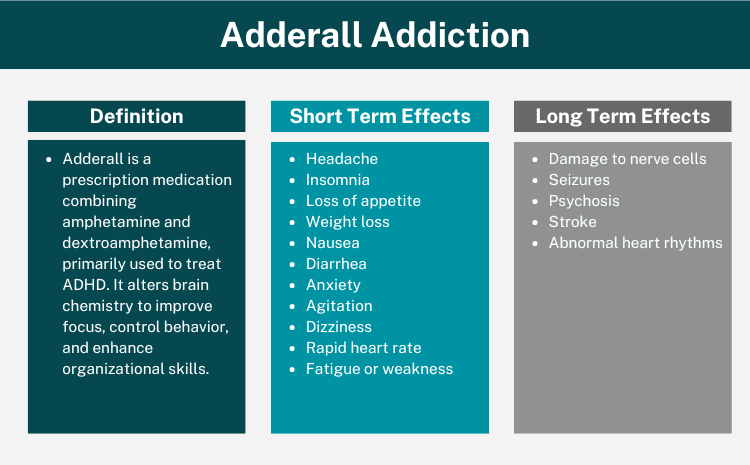Adderall Addiction: Causes, Effects, and Treatment
Adderall was initially developed to treat ADHD and narcolepsy. Its history, however, dates back to the late 1920s when American chemist Gordon Alles synthesized amphetamine while searching for an asthma treatment. Over time, what started as a medical breakthrough has, for many, turned into a source of addiction.”
Alles discovered that amphetamine could elevate mood and boost energy, leading to its use in treating conditions like depression and weight loss by the 1930s. During World War II, the American military issued amphetamines to keep soldiers alert. However, widespread use in the following decades led to strict regulations by the 1970s due to their addictive nature.

What Is Adderall?
Adderall is a prescription medication combining amphetamine and dextroamphetamine, primarily used to treat ADHD. It alters brain chemistry to improve focus, control behavior, and enhance organizational skills, helping individuals with ADHD manage daily activities more effectively.
Besides ADHD, Adderall is prescribed for narcolepsy, a condition causing excessive daytime sleepiness. It helps maintain wakefulness but should not be used for general tiredness or to avoid sleep in those without a sleep disorder.
Adderall Addiction and Dependence
Using amphetamines and stimulants like Adderall can lead to tolerance and physiological dependence, which might develop into a substance use disorder. Misuse of Adderall, whether to boost academic performance or mitigate the effects of other drugs, is linked to substance use disorders and the use of other substances.
However, when used as prescribed for individuals with a proper diagnosis, Adderall does not typically lead to a stimulant use disorder.
Who Abuses Adderall and Why Is It So Common?
Adderall is abused by various groups of people for different reasons. Here are some key factors that contribute to its widespread misuse:
- Students and Professionals: Many students misuse Adderall to enhance focus and concentration during exams or long study sessions. Professionals might misuse it to boost productivity and manage heavy workloads.
- Athletes: Some athletes take Adderall to improve their performance and energy levels during training and competitions.
- People with Eating Disorders: Adderall can suppress appetite, making it appealing to individuals struggling with eating disorders who use it for weight loss and increased focus.
- Recreational Use: Adderall is sometimes used recreationally to stay awake longer, party, experience euphoria, or enhance social performance.
Also, the number of Adderall prescriptions has risen, especially for ADHD. In 2018, over 25 million prescriptions were issued, making it one of the most prescribed drugs in the U.S.
Effects and Risks of Adderall
How Does Adderall Affect the Body?
Adderall consists of two central nervous system stimulants: amphetamine and dextroamphetamine. These chemicals mimic the action of neurotransmitters like dopamine, epinephrine (adrenaline), and norepinephrine in the brain.
Dopamine, known as the ‘reward’ chemical, explains why Adderall can create feelings of euphoria. It also helps maintain focus by reducing distractions.
Epinephrine activates the sympathetic nervous system, inducing a fight-or-flight response that increases alertness, clarity, and focus while suppressing appetite. Adderall keeps norepinephrine in the synapses longer than adrenaline, enhancing and sustaining this response.
These effects come with potential risks and side effects that must be carefully considered.
Warning Signs of Adderall Misuse
Adderall misuse happens when the medication is used for unintended purposes. Many people without ADHD mistakenly believe that taking Adderall or similar medications like Concerta, Dexedrine, Modafinil, and Ritalin is as harmless as drinking coffee. However, abusing these drugs can cause significant harm.
Signs of Adderall misuse include:
- Take someone else’s prescription
- Use a higher dose than prescribed
- Inject, snort, or smoke the pills
- Mix the pills with other drugs or alcohol
- Use them to get high or to keep up with school studies
Some older adults might take Adderall to prevent memory loss. However, doing so without a doctor’s approval can lead to significant physical and mental health problems.
Short Term Side Effects of Adderall
Chronic misuse of Adderall, especially at high doses, can lead to various unwanted health effects. These side effects can sometimes result in serious medical complications. It’s important to be aware of the common short-term side effects associated with Adderall use:
- Headache
- Insomnia
- Loss of appetite
- Weight loss
- Nausea
- Diarrhea
- Anxiety
- Agitation
- Dizziness
- Rapid heart rate
- Fatigue or weakness
Those who snort, smoke, or inject Adderall are more likely to experience severe side effects.
Long-Term Effects of Adderall
While Adderall can enhance mental and physical performance, prolonged use or short-term high doses can cause significant health issues. Chronic central nervous system stimulation from Adderall can lead to long-term effects, such as:
- Damage to nerve cells
- Seizures
- Psychosis
- Stroke
- Abnormal heart rhythms
Knowing these long-term effects can help individuals make informed health decisions.
Adderall Overdose
While rare and minimal at therapeutic doses, Adderall’s toxic side effects can lead to overdose and severe complications, including liver damage, when taken in high doses.
Signs and symptoms of acute amphetamine intoxication can include:
- Chest pain
- Racing heart
- Confusion or disorientation
- Hyperactivity
- Psychotic symptoms
- Anxiety
- Agitation
- Dizziness
- Rapid heart rate
- Fatigue or weakness
In the case of an Adderall overdose, the symptoms of acute intoxication may also include:
- Life-threateningly high blood pressure
- Rapid heart rate with an abnormal rhythm
- Stroke
- Aggression or assaultive behavior
- Hallucinations
- Panic
- Rhabdomyolysis (a potentially fatal or disabling condition)
- Serotonin syndrome (a potentially life-threatening drug reaction)
- Seizures
- Coma
- Death
If you suspect someone is overdosing on Adderall or any other drug, call 911 immediately. Try to keep the person awake and breathing, turn them on their side to prevent choking, and stay with them until help arrives.
Adderall withdrawal symptoms
Most people with stimulant use disorder experience withdrawal symptoms. Acute withdrawal symptoms usually occur after repetitive high-dose uses, known as binges, and typically subside within one week. Although Adderall withdrawal doesn’t usually involve severe discomfort or medical danger, intense depression symptoms can occur, similar to major depressive episodes, increasing the risk of suicide.
Common Adderall withdrawal symptoms include:
- Depression
- Excessive sleeping or insomnia
- Fatigue
- Anxiety
- Irritability
- Poor concentration
- Decrease in mental and physical activities
- Increased appetite
- Paranoia
- Drug cravings
Understanding Adderall withdrawal symptoms is crucial for effective management. If you or a loved one is experiencing these symptoms, seeking professional help can provide the necessary support and resources to navigate this challenging period.
Adderall Addiction Treatment and Recovery
Adderall Addiction Signs
Adderall addiction can significantly impact daily life. According to the American Psychiatric Association’s DSM-5, stimulant use disorder involves a pattern of use causing distress or impairment, marked by at least two of the following symptoms within a year:
- Using the drug in larger doses or for longer than intended
- Persistent desire to use or unsuccessful attempts to decrease or stop use
- Spending a lot of time obtaining, using, or recovering from the drug
- Cravings or strong urges to use
- Recurrent use leading to failure to meet obligations at school, home, or work
- Continued use despite social or interpersonal problems
- Reducing or abandoning recreational, work, or social activities
- Using in situations where it is physically hazardous
- Ongoing use despite knowledge of physical or psychological problems caused or worsened by the drug
- Developing tolerance, needing more of the drug to achieve the same effect
- Experiencing withdrawal symptoms or using the drug to avoid withdrawal
Recognizing these signs can help in identifying Adderall addiction early and seeking appropriate treatment.
How to Treat Adderall Addiction
Adderall addiction is a disease that can be effectively treated through various methods, including counseling and behavioral therapy. Treatment options are diverse, and the right approach depends on the individual. It’s important to address all aspects of the patient’s needs, not just the drug use. Co-occurring mental health conditions like anxiety and depression are typically treated concurrently in drug rehab.
Common levels of care for treating Adderall addiction include:
- Inpatient Treatment: This involves 24/7 care and monitoring in a residential setting. It includes structured days filled with therapy, supervision, counseling, and psychoeducation.
- Outpatient Treatment: These programs vary in intensity and can include traditional outpatient rehab, partial hospitalization programs (PHPs), intensive outpatient programs (IOPs), and telehealth services.
- Aftercare Programs: To support long-term recovery, aftercare includes sober living facilities, ongoing therapy, 12-Step programs, and more.
Treatment for stimulant use disorders often involves individual and group counseling using behavioral therapies such as:
- Contingency Management: This approach uses rewards as motivational incentives and positive reinforcement to promote abstinence.
- Community Reinforcement Approach: Clinicians help patients adjust aspects of their lives that interfere with a healthy lifestyle.
- Cognitive Behavioral Therapy (CBT): CBT helps patients identify and deal with situations in which they might have previously used drugs.
- Matrix Model: A structured, multicomponent behavioral therapy that includes individual counseling, CBT, family education, social support, and more.
Effective treatment goes beyond merely stopping drug use; it involves helping individuals rebuild their lives, improve their mental and physical health, and develop healthy coping mechanisms. This holistic approach ensures that all underlying issues, such as co-occurring mental health conditions and social factors, are addressed, promoting long-term recovery and overall well-being.
Seek Help for Adderall Addiction Today
If you or a loved one is struggling with Adderall addiction, it’s important to seek help as soon as possible. Addiction can be a challenging and isolating experience, but support and treatment are available.
Taking the first step towards recovery can be daunting, but there are many resources and professionals ready to help you navigate this journey. Reach out to a healthcare provider, addiction specialist, or a local rehabilitation center to discuss your options.
Early intervention can make a significant difference in recovery outcomes. By seeking help, you are not only improving your own life but also supporting the well-being of those around you. Remember, you don’t have to face this alone—support is available.
Don’t wait—seek help for Adderall addiction today and take the first step towards a healthier, drug-free life.
